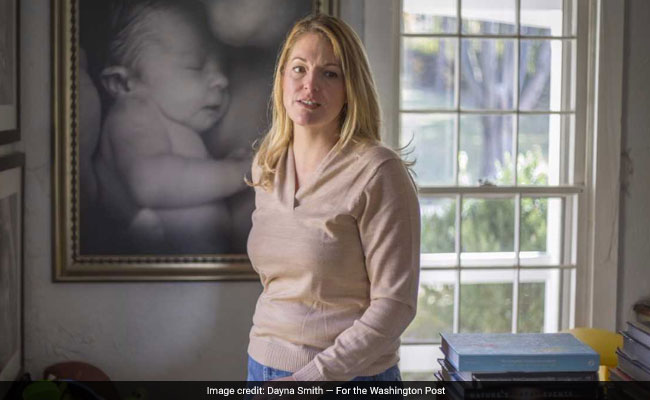
In 2015, Joyal formally created a nonprofit called Evermore to help address the issues she was finding.
It’s not what she set out to do, but Joyal Mulheron has become a collector of the worst kinds of stories. The ones no one wants to hear.
About the mom who was lying in bed when her 20-year-old son was shot just down the block. About the dad whose teenage daughter collapsed and died from unknown causes in the front hall of their home. About the single mother whose 7-week-old baby stopped breathing at his day-care center and was dead by the time she arrived.
Joyal knows that people turn away from these stories, that the suffering is too much to comprehend. She might have turned away, too – if she hadn’t lived it herself.
As a kid in Crosby, Texas, she watched her best friend grow ill with leukemia. When the 7-year-old died, Joyal didn’t think much about her friend’s parents. She mostly wondered why they’d kept her away during her friend’s waning days.
She was sure, throughout her teens, that she’d become a pediatric oncologist. But at Virginia Tech, the humanities beckoned and she majored in English and biochemistry. After college, she found work blending her areas of interest, translating science into layman’s terms for the American Cancer Society. She spent seven years there while getting married, earning a master’s in biochemistry, consulting for the National Academies of Science and doing a little teaching on the side.
Joyal, who now lives in Montclair, Virginia, was helping to lead an anti-obesity initiative with the National Governors Association when she gave birth to her first child, a daughter. She and her husband adopted a second girl from Ethiopia. Everything seemed fine when she became pregnant with their third daughter, too, until the end of the second trimester, when a doctor and a technician started using hushed tones as they studied her sonogram. Something was off, though doctors offered no definitive diagnosis.
Immediately after delivery in June 2010, the baby was whisked off to the neonatal intensive care unit. The Mulherons were told that she had a chromosomal abnormality that affected her digestive system and that she could die within hours, maybe even minutes. But Eleanora lived for almost five months. Thanks in part to her scientific background, Joyal was able to take the baby home, calculate the right concentrations of food that Eleanora’s tiny stomach could hold and insert a feeding tube into her nose.
But nothing prepared her for what came after Eleanora died. Family members would find Joyal outside in the frigid November wind, coatless, rocking back and forth. “I couldn’t tell you for weeks if I had showered or if I had eaten that day,” says Joyal, now 41.
“See a therapist,” well-meaning friends urged.
“But to even think I would have had the wherewithal to navigate that? To find the support I would have needed was incomprehensible,” she says.
Slowly, over weeks and months and years, some of the fog lifted, even as the insomnia and the grief persisted. She found a new job in health-care policy and cried every day, driving to and from work.
All the while she replayed the events surrounding her daughter’s life and death, mulling the circumstances that compounded the pain, and the kindnesses that offered slivers of relief. She thought often of the anonymous stranger who gave up a bed in the hospital sleep center so that she could rest for a few hours without being far from Eleanora. And she thought about the calls from the insurance company, asking when, precisely, they expected their daughter to die.
“Do you think she’s going to live for 10 days? Or do you think she’s going to live for more than 10 days? Because I have to fill out different paperwork,” Joyal remembers the insurance representative saying.
Joyal began applying her policy brain to the issue and found that parents who’ve lost children are a vastly understudied group. Yet the little research that has been done shows devastating results. “The National Academies of Science said in a report that child death is the most stressful (event) and enduring type of stress a person can experience,” she says. Other studies showed that losing a child results in increased likelihood of psychiatric hospitalization, cardiac problems and premature death.
“When people say, ‘Isn’t it so amazing, so sweet that Debbie Reynolds died the day after Carrie Fisher?’ the answer is no. This is one health outcome for people who lose a child,” she says.
Joyal left her job and spent a year interviewing dozens of parents who’d lost children. Some, like her, had lost infants. Others had lost adult children. Some had died of cancer, others from suicide, or in war or car accidents, or as a result of violence. Though the circumstances varied, the parents all shared the same feeling: “I should have protected my child. I should have done something differently. I am the parent and ultimately it was my responsibility.”
Many of the parents she spoke with also had a lingering wish to die, “to be with my child,” and were plagued by questions about their relationship with God.
In 2015, Joyal formally created a nonprofit called Evermore to help address the issues she was finding. She set up a parent-to-parent network so that people who’d lost kids to drug overdoses, for instance, could connect with one another. She began videotaping lengthy interviews with grieving parents so that others could at least experience the comfort of knowing that they’re not alone.
And she began making the rounds in Washington, D.C., banging the drum to make the major government and national health organizations pay attention, in hopes that they’ll devote research money and develop best practices to support parents who’ve lost children.
Joyal, who now has a fourth child, a son, knows that no one can prevent child death. “Unfortunately, it will continue to happen,” she says. “So when it does happen, how do we make it the least traumatizing for people?”
What she didn’t expect was that she’d receive calls late at night, from parents facing eviction as they grapple with a dead child’s medical bills. Or before 9 a.m., from upper-middle-class parents already intoxicated and overcome with regret that they hadn’t found better doctors to treat their child’s cancer.
She’s not a grief expert, but she has developed a vast directory of people who are. So she points the anguished callers in the right direction and tries, at every turn, to spread the word about the kind of support grieving parents need.
“When a family is in chaos, you need stability,” she says. “Even if that means that at 4 o’clock every Tuesday, someone is going to bring you an ice cream bar. The level of stability you can help a family feel when they’re in an unstable environment is such a gift.”
This is not the kind of wisdom Joyal ever hoped to accrue. But it’s hers now. And all she can do is wake up each day and put it to use.
[“Source-ndtv”]










